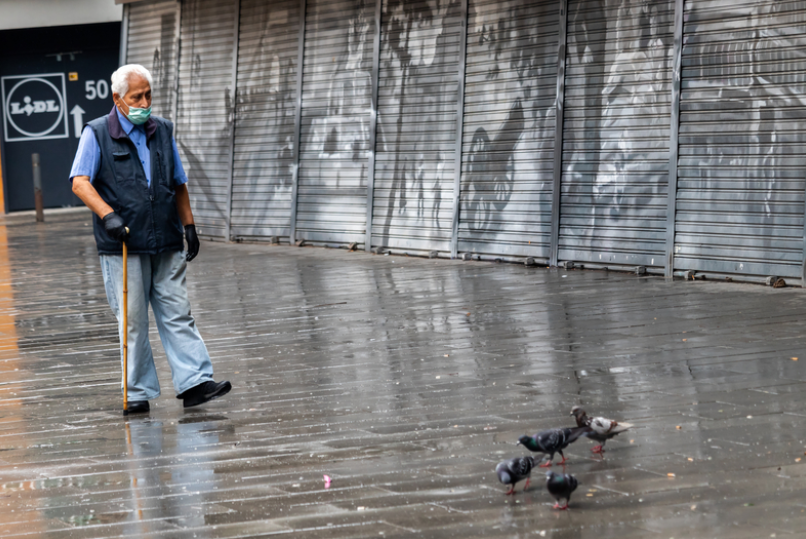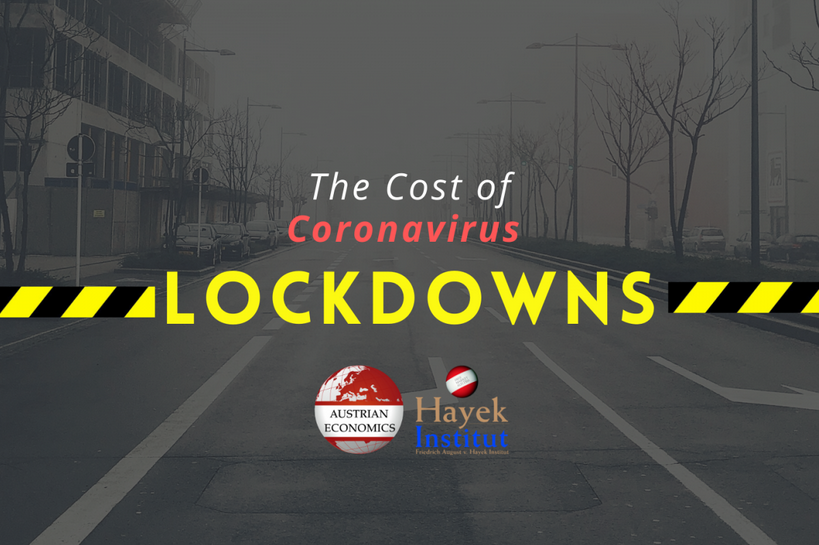By Dr. Federica Saini Fasanotti Malta is a compact archipelago in the Mediterranean Sea, 80 km from Sicily, 333 km from Libya and 284 km from Tunisia. It had a long list of rulers, including the Phoenicians, the Byzantines, the Arabs and later the French under Napoleon and finally the British. The island gained independence in 1964, and in 2004 it joined the European Union. In recent years, the smallest EU member state, with a population of less than half a million, has seen the greatest economic growth on the entire continent. Still, it has no motorways or railways, and its infrastructure does not reflect the country’s newfound prosperity. Malta relies heavily on trade with foreign countries (financial services), on the manufacturing sector (textiles and
Topics:
hayek_admin considers the following as important: 6b.) Austrian center, 6b) Austrian Economics, blog, Featured, newsletter
This could be interesting, too:
Clemens Schneider writes Café Kyiv
Clemens Schneider writes Germaine de Stael
Clemens Schneider writes Museums-Empfehlung National Portrait Gallery
Clemens Schneider writes Entwicklungszusammenarbeit privatisieren
Malta is a compact archipelago in the Mediterranean Sea, 80 km from Sicily, 333 km from Libya and 284 km from Tunisia. It had a long list of rulers, including the Phoenicians, the Byzantines, the Arabs and later the French under Napoleon and finally the British. The island gained independence in 1964, and in 2004 it joined the European Union.
In recent years, the smallest EU member state, with a population of less than half a million, has seen the greatest economic growth on the entire continent. Still, it has no motorways or railways, and its infrastructure does not reflect the country’s newfound prosperity. Malta relies heavily on trade with foreign countries (financial services), on the manufacturing sector (textiles and electronics) and on tourism. The country is also Europe’s main online betting hub, a sector that kept the economy afloat during the pandemic.
On July 4, 2018, the Maltese Parliament approved three bills establishing the first legislation regulating blockchain, cryptocurrencies and distributed ledger technology. Betting on the high potential of these innovations, the Maltese government decided to invest heavily in the hope of becoming a technology leader among European countries.
The country is currently ruled by the Labour Party under Prime Minister Robert Abela, who acceded to power in January 2020 after the resignation of Joseph Muscat in the aftermath of the murder of journalist Daphne Caruana Galizia.
Migration issues
Malta has never had and will probably never have the structural capacity and the institutional means to effectively manage the enormous influx of migrants on its shores. The reception facilities on the island can accommodate 1,500-2,000 people. This is a small number, especially if one considers that the 20-square-kilometer Italian island of Lampedusa can host almost 1,000 people – although with great difficulty. There have been riots in the main Maltese immigration camp, Hal Safi. Both the local and international press often decry prison-like conditions at the compound, while Maltese politicians deny the facilities are inadequate. In 2020, the UNHCR estimated that about 1,700 people were held in the three Maltese centers – the Initial Reception Center Marsa, the Safi Barracks in Hal Safi, and the Lyster Barracks. The European Committee for the Prevention of Torture and Inhuman or Degrading Treatment or Punishment (CPT), in March 2021, published a report calling for radical changes in how the camps are run.
Being in the natural route between Libya and Italy, the Maltese government had little time to react when the refugee crisis struck. It had to manage border crossing points with little consideration for strategy, only survival. In 2019 alone, almost 3,500 people entered Malta and in the first half of 2020, 1,200 more arrived.
Valletta’s policy is twofold. On one hand, it fulfills its obligations at the European level. Malta, at least on paper, has always claimed its humanitarian commitment to rescuing migrants and its willingness to respect international conventions. On the other, however, according to some sources, local authorities have begun to seek agreements with Libyan militias to reduce the incoming flow of migrants.
On September 23, 2019, the French, German, Italian and Maltese interior ministers signed a joint declaration known as the Malta agreement. The document foresees a more even distribution of migrants rescued at sea among signatories and faster relocation of asylum seekers. The measures only concern migrants found at sea and not those independently arriving on European coasts, which make up the majority of migration. But the deal was never implemented. Italy, in particular, repeatedly attempted to introduce automatic mechanisms to relocate migrants, but in vain.
The European Commission has also held several meetings exploring possible solutions to relieve the countries most affected, but most often the talks appeared to be ineffective. As a result, the government of Malta, frustrated by a lack of European solidarity during both the migrant crisis and the pandemic, is becoming increasingly critical of the EU.
Although getting a handle on irregular migration is essential for Europe, there is still no comprehensive strategy. The New Pact on Migration and Asylum only highlights the long road ahead. Malta has the highest numbers of refugees per capita in the EU, and one of the highest numbers of irregular migrant arrivals compared to its population. For many years Malta abided by the Dublin Regulation, which requires that asylum applications be processed in the country of arrival, but the burden has gradually become untenable.
Immigration has become one of Europe’s thorniest problems. On one side, the coalition of the willing – Germany and France and southern member states – calls for solidarity and reforms. On the other, the Visegrad Four, Hungary, Poland, the Czech Republic and Slovakia, are reluctant to modify the current migration framework.
Like Italy, Malta would like to see a functional relocation system for migrants. Most asylum seekers arriving to its shores come from Libya. For that reason, last summer the Maltese government decided to support the Turkish military intervention in favor of the Libyan Government of National Accord (GNA) and to collaborate with the United States to fight organized criminal gangs – “militias” – in Tripoli.
In June 2020, rumors of a secret agreement between Malta and Libya emerged. Valletta allegedly authorized the Libyan Coast Guard to enter Malta’s search and rescue region to round up migrants and take them back to Libya. Such an arrangement would violate international law. The Maltese authorities argued that the Libyan Coast Guard had only intervened in deep-sea areas, where foreign authorities are allowed to operate to counter criminal activities. Valletta also maintained that the goal of the agreement was to tackle human trafficking.
The discovery of these links did nothing to boost Malta’s reputation as a reliable partner to handle the inflow of migrants in the Mediterranean. Numerous testimonies report that the Maltese authorities use unregistered ships to redirect incoming boats to other routes, mostly toward Italy, even supplying them with fuel to continue the crossing. According to a spokesperson for Prime Minister Robert Abela, without this measure, the island would have been “submerged by migrants.”
At the beginning of March 2021, the Maltese Minister of Foreign and European Affairs Evarist Bartolo met with the designated Prime Minister of Libya Abdul Hamid Dbeibeh. Minister Bartolo confirmed that the opening of a Maltese consulate and embassy in Tripoli was a priority so that Libyans could apply for visas and residence permits. They also discussed the resumption of flights between Libya and Malta. The meeting was followed by another one, with Maltese Prime Minister Abela this time, in late April.
Scenarios
As of May 2021, Malta reported over 30,000 confirmed Covid-19 cases and 417 deaths since the outbreak. The pandemic still heavily affects tourism and many other industries.
During the initial stages of the crisis, Europe imposed export bans on medicines and personal protective equipment, forcing some countries to look east. Malta had to rely on China, Hong Kong, Egypt, India, Kuwait and Japan. Italy, Germany and Spain also provided limited support.
Already beleaguered by migration and economic issues, the ruling Labour Party is now harshly criticizing the EU for its lack of support. In parallel, it has begun to invest in strategic relations beyond Europe. There is no doubt that in policy areas like migration, Malta will continue to press for a more cohesive Union. However, in the short term at least, the island will also seek bilateral partnerships when it benefits its national interests.
While the pandemic and immigration are the most salient short to medium-term issues, long-term the island could also face an existential threat because of rising sea levels – unless the EU and northern Mediterranean states address the issue before it is too late.
The post Malta under pressure appeared first on Austrian Economics Center.
Tags: Blog,Featured,newsletter






